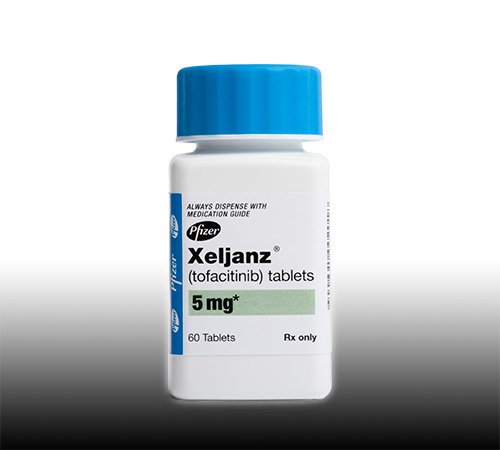Updated
Medical studies and clinical trials have found that Xeljanz can cause cancer. This side effect of the popular drug for rheumatoid arthritis can put unsuspecting people at serious risk of a potentially fatal medical condition. Nevertheless, Xeljanz’s manufacturer, Pfizer, has downplayed the risk on the Xeljanz warning label, leaving patients to suffer from the development of:
- Non-melanoma skin cancer,
- Lymphoma,
- Lung cancer,
- Breast cancer, and
- Gastric cancer.
The lawyers at the Shouse Law Office are filing Xeljanz lawsuits on behalf of victims, seeking compensation for their losses and accountability from Pfizer for failing to warn doctors and patients of the risks of taking their drug. In this article, they discuss:
- 1. What is Xeljanz?
- 2. Side effects of Xeljanz
- 3. Studies and clinical trials connect Xeljanz to a variety of cancers
- 4. Lawsuits against Pfizer for cancer caused by Xeljanz

1. What is Xeljanz?
Xeljanz is Pfizer’s brand name for its drug tofacitinib, a pill-based treatment for rheumatoid arthritis.
Xeljanz works by inhibiting Janus kinase enzymes, which can inflame and damage joints and cause arthritis. Xeljanz quickly became popular as a rheumatoid arthritis treatment because it replaced earlier treatments that had to be injected.
Pfizer originally received approval of tofacitinib from the U.S. Food and Drug Administration (FDA) in November, 2012 to treat rheumatoid arthritis.1 Xeljanz was later approved by the FDA to treat ulcerative colitis in May, 2018.2
2. Side effects of Xeljanz
Xeljanz, however, comes with some troublingly severe side effects, including:
- Cancer,
- Infections,
- Pulmonary embolisms, especially when taken administered in a high dose, and
- Liver damage.
Some of these side effects can be life-threatening.
3. Studies and clinical trials connect Xeljanz to a variety of cancers
One of the potentially fatal side effects of Xeljanz is that it can cause cancer – a connection that numerous medical studies and clinical trials for the drug have confirmed. Unlike many other drugs, though, Xeljanz has been associated with causing cells to become malignant. Therefore, rather than causing one particular type of cancer, Xeljanz has been connected to a variety of forms of cancer, including3:
- Lung cancer,
- Breast cancer,
- Lymphoma,
- Gastric cancer,
- Melanoma,
- Non-melanoma skin cancer,
- Prostate cancer, and
- Pancreatic cancer.
While Pfizer claims that everyone with rheumatoid arthritis faces an increased risk for malignancies and cancer, the numbers from the clinical trials and other studies seem to suggest that Xeljanz exacerbates the potential.
These clinical trials came in three phases – there were two in Phase I,4 nine clinical trials in Phase II,5 and six in Phase III.6 Additionally, there were two long-term extension trials for Xeljanz.7 Phases I-III covered 5,497 people taking Xeljanz. The long-term extension trials tracked 2,794 qualifying patients from these Phases.8
Two medical studies analyzed the results of these clinical trials. Because of the time of publication, neither one could count all of the patients included in the clinical trials. One of the studies only counted those who developed cancer and those who developed non-melanoma skin cancer.9 The other study noted which type of cancer occurred in trial participants10:
| Cohen et al., | Curtis et al., | |
| Total Xeljanz Patients Covered | 6,194 | 5,671 |
| All Cancer (Not Including Non-Melanoma Skin Cancer) | 173 | 107 |
| Lung Cancer | 24 | |
| Breast Cancer | 19 | |
| Lymphoma | 10 | |
| Gastric Cancer | 6 | |
| Non-Melanoma Skin Cancer | 118 | 82 |
None of the patients in the placebo groups for these trials developed any malignancies, at all.11
Both studies agreed that the amount of time that a patient took Xeljanz did not affect how likely they were to develop cancer – people who took Xeljanz for years were just as likely to develop cancer as those who had only just begun Xeljanz treatment for their rheumatoid arthritis. One suggested that smoking habits in the trial participants likely inflated the number of people who developed lung cancer.12
According to Pfizer, malignant tumors were more likely to develop in people who took the 10 milligram pill of Xeljanz twice per day than those on lower doses.13

4. Lawsuits against Pfizer for cancer caused by Xeljanz
The increased risk for a malignancy that comes with taking Xeljanz has led to hundreds of people filing Xeljanz lawsuits against Pfizer. These legal claims for compensation argue that Pfizer failed to adequately warn doctors and patients about the cancerous risks on Xeljanz’s warning label. They all demand compensation for:
- Medical expenses,
- Lost wages,
- Lowered earning capacity,
- Pain and suffering, and
- Loss of consortium.
Many lawsuits also demand punitive damages be assessed against Pfizer for their conduct.
Currently, these lawsuits are progressing through the legal system independently of one another. However, because all of the victims have suffered similar injuries from a single course of conduct, it seems likely that they will be consolidated into a multidistrict litigation, or MDL, in the near future.
References:
- FDA Approval Letter for Xeljanz (November 6, 2012).
- FDA Approval Letter for Xeljanz to Treat Ulcerative Colitis (May 30, 2018).
- Xeljanz Warning Label (May 2018).
- ClinicalTrials.gov Identifier No. NCT01262118, “Effects Of CP-690,550 (Tasocitinib) On Cholesterol Metabolism In Patients With Active Rheumatoid Arthritis,” and Identifier No. NCT01484561, “A Study To Evaluate The Effect Of CP-690,550 On Measures Of Kidney Function In Patients With Active Rheumatoid Arthritis.”
- ClinicalTrials.gov Identifier No. NCT00147498, “Three Dose Levels of CP-690,550 Monotherapy Versus Placebo, Administered Orally Twice Daily (BID) for 6 Weeks,” Identifier No. NCT00413660, “Comparison Of 6 CP-690,550 Doses Vs.Placebo, Each Combined With Methotrexate, For The Treatment Of Rheumatoid Arthritis,” Identifier No. NCT00550446, “A Phase 2 Study For Patients With A Physician’s Diagnosis Of Rheumatoid Arthritis,” Identifier No. NCT00603512, “Comparison Of 4 CP-690,550 Doses Vs. Placebo, Each Combined With Methotrexate, For The Treatment Of Rheumatoid Arthritis in Japan,” Identifier No. NCT00687193, “Comparison Of 5 CP-690,550 Doses Vs. Placebo, For The Treatment Of Rheumatoid Arthritis In Japan,” Identifier No. NCT01164579, “Effects of Tofacitinib (CP-690,550) on Magnetic Resonance Imaging (MRI)- Assessed Joint Structure In Early Rheumatoid Arthritis (RA),” Identifier No. NCT00976599, “A Study To Evaluate The Mechanism Of Action Of CP-690,550 In Patients With Rheumatoid Arthritis,” Identifier No. NCT01059864, “Study Of The Effects Of Atorvastatin On Cholesterol Levels In Rheumatoid Arthritis Patients Taking CP-690,550,” and Identifier No. NCT01359150, “A Study To Assess the Immune Response Following Administration Of Influenza and Pneumococcal Vaccines To Subjects With Rheumatoid Arthritis Receiving CP-690,550 Or Placebo.”
- ClinicalTrials.gov Identifier No. NCT00960440, “Study of CP-690,550 Versus Placebo In Rheumatoid Arthritis Patients On Background Methotrexate With Inadequate Response To Tumor Necrosis Factor (TNF) Inhibitors,” Identifier No. NCT00847613, “A 2-Year Phase 3 Study Of CP-690,550 In Patients With Active Rheumatoid Arthritis On Background Methotrexate,” Identifier No. NCT00814307, “A Phase 3 Study Comparing 2 Doses of CP-690,550 vs. Placebo for Treatment of Rheumatoid Arthritis,” Identifier No. NCT00856544, “A Study Comparing 2 Doses Of CP-690,550 Vs. Placebo For The Treatment Of Rheumatoid Arthritis In Patients On Other Background Arthritis Medications,” Identifier No. NCT00853385, “A Phase 3 Study Comparing 2 Doses Of CP-690,550 And The Active Comparator, Humira (Adalimumab) Vs. Placebo For Treatment Of Rheumatoid Arthritis,” and Identifier No. NCT01039688, “Comparing The Effectiveness And Safety Of 2 Doses Of An Experimental Drug, CP-690,550, To Methotrexate (MTX) In Patients With Rheumatoid Arthritis Who Have Not Previously Received MTX (ORAL1069).”
- ClinicalTrials.gov Identifier No. NCT00413699, “Long-Term Effectiveness And Safety Of CP-690,550 For The Treatment Of Rheumatoid Arthritis,” and Identifier No. NCT00661661, “Long-Term, Open-Label Study Of CP-690,550 For Treatment Of Rheumatoid Arthritis In Japan.”
- Cohen SB, Tanaka Y, Mariette X, et al., “Long-term safety of tofacitinib for the treatment of rheumatoid arthritis up to 8.5 years: integrated analysis of data from the global clinical trials,” Annals of the Rheumatic Diseases 76(7):1253-1262 (2017).
- See note 8.
- Curtis JR, Lee EB, Kaplan IV, et al., “Tofacitinib, an oral Janus kinase inhibitor: analysis of malignancies across the rheumatoid arthritis clinical development programme,” Annals of the Rheumatic Diseases 75(5):831-41 (2016).
- See note 10.
- See note 10.
- Press Release, “Communication of new safety information for Xeljanz (tofacitinib),” Pfizer (February 28, 2019).
